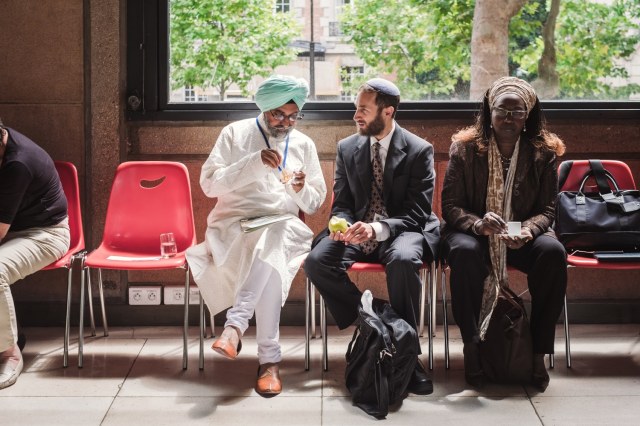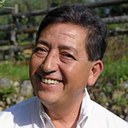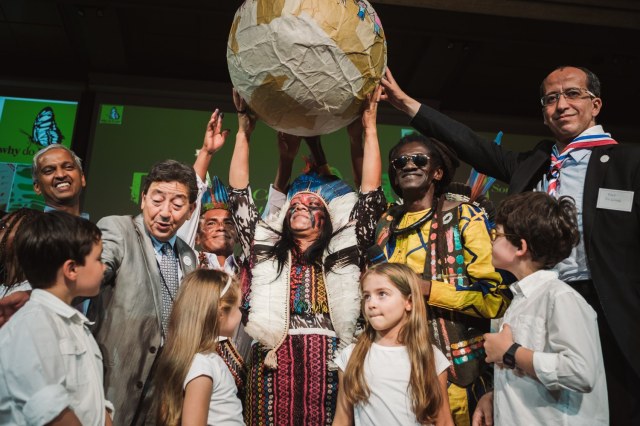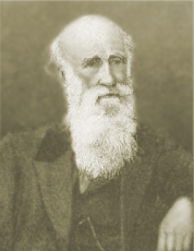Not only a political economic or ecological issue but the future of humanity that is at stake.
“Climate change is the defining challenge of our time. It affects us all, but it does not affect us all equally. We have a profound responsibility to protect and assist the world’s poorest and most vulnerable people and to pass on to future generations a planet that is thriving and healthy.”
Continuation of ‘Paris World Summit of Conscience, International interfaith gathering’ #1 & 2
![]() For people who believe in the Divine Creator God and honour and worship Him there is no question that we can keep ourselves at the side and do nothing to change the way the world is behaving at the moment. Jews, Non-trinitarian and trinitarian Christians, Muslims who do know their Holy Scriptures are aware that man has no excuse how he treats the creation of the Most High.
For people who believe in the Divine Creator God and honour and worship Him there is no question that we can keep ourselves at the side and do nothing to change the way the world is behaving at the moment. Jews, Non-trinitarian and trinitarian Christians, Muslims who do know their Holy Scriptures are aware that man has no excuse how he treats the creation of the Most High.
Perhaps people may be a little bit selfish, in a certain way,trying to make a nice living and trying to make a better place for themselves. And it can well be that “Selfishness” does not have to mean being shortsighted and harmful to others, but we all do have to know what ever we do for ourselves may also effect the life of others. Often we find Christians thinking they are the only ones who have an idea about God’s creation and respect it. Some of them, like several atheists may see that man in his position has to play an important role in that universe. They see the dangers of our way of living at the moment. They fear climate change and know we do have something to do against it.
But also people from other religions, like Hindus as Mahamandeshwar Swami Avdeshanand Giri, religious leader of the Hindu Dharma Acharya Sabha, India, said they saw climate change both as an existential threat and as an opportunity for renewal.In the afternoon reverend Takayuki Ashizu, Chief priest of Munakata Grand Shrine (Japan) was part of a discussion pannel with Jean-Luc Fauque, President of the Supreme Council of the European Confederation – the Scottish Rite, Rev. Fletcher Harper, Director of GreenFaith (USA), Sister Chan Khong, representative of the Thich Nhat Hanh Community (France), Fr. Dominique Lang, Chaplain of Pax Christi France, Author of the blog “Churches and Ecology”, and Mr Henrik Madsen, CEO DNV-GL, Norway.
Hindu leader Nandita Krishna, who has restored 50 sacred forests, feared that insatiable greed had gripped everyone on earth and this had led to climate change.
“We cannot replicate the environment or create it. Unless we see the divine in creation we will not understand our role and duty as humans,”
she said.
Bishop Nathan Kyamanywa, Bishop of Bunyoro Kitara (Uganda) was in charge of the Keynote addresses of the third plenary.
Bringing the day into its discussion between panelists Dr Vinya Ariyaratne, Director of the Sarvodaya Shramadana Movement (Sri Lanka), M. Swami Amritasvarupananda, Amma’s representative (India), Sheikh Khaled Bentounes, Spiritual Guide of the Alawiyya Sufi brotherhood (Algeria), M Sailesh Rao, Director of “Climat Healers Initiative for Transformations” (USA), Ms Alina Saba, Environnemental activist (Nepal) and Bishop Frederick Onael Shoo, Founder of the Lutheran Movement for the Environment in Africa (Tanzania).
Sheikh Bentounes, leader of the Sufi brotherhood Alawiya, urged mankind to carry “a hope of a future”.
Rabbi David Rosen, international director of Inter Religious Affairs “of the American Jewish Committee said:
“Climate change takes place where there is unbridled avarice. It is a symptom of the disease and cry for us to respond. It is the opportunity for humans to rediscover the higher values than materialism and indulgence.”
Ecumenical Patriarch Bartholomew I, the president of the Pontifical Council for Justice and Peace, leader of 300 million Orthodox Christians, despaired at humanity’s blindness, but quoted writer Fyodor Dostoevsky saying that
“beauty would save the earth”.
For him as for many others it is clear that scientists and theologians agree that humanity depends on nature. Therefore he made an urgent appeal:
We must accept the moral imperative for action. Religion must also be involved in the crucial question of climate change.”
Mary Robinson, who served as the seventh, and first female, President of Ireland from 1990 to 1997, and the United Nations High Commissioner for Human Rights, from 1997 to 2002, as President of the Mary Robinson Foundation- Climate Justice, found it truly inspiring to see leaders at this meeting in Paris from so many faiths and secular traditions, and to hear of their impressive commitment to the simple yet deeply profound message: “why I care”.
She said
Our lived experiences, our religious beliefs and our cultural backgrounds may be diverse – but you are showing that great traditions have a shared sense of morality and fairness, and a collective recognition of the need to act on climate change to protect people and our common home.
For her this is an example of human solidarity at work.
She outlined why she believes that it is this human solidarity that is the key to igniting
global will to act on the climate.
The idea of human solidarity is sometimes misunderstood. Some people say that it is a well-meaning moral guideline, but it does not help political leaders to conduct negotiations and reach complicated legal agreements – including those that will be needed to reach a climate agreement in Paris later this year.
and said why she disagreed with this view.
Because if we look past all the complex science, economics, legal arguments and political negotiations which are necessary parts of the process towards a climate agreement, we can see that acting on climate change can be summarised very simply:
we can solve climate change if we care about each other, and if we act to help each other.Passing those two tests is the challenge of our generation, and will decide whether we leave our children and grandchildren a safe world of hope and fairness, or a world where climate change is causing misery and stress.
She spend a lot of time listening to people all around the world, and she thinks that a lot more people care about fairness and our collective future than we sometimes realise.
All across the world, people are witnessing the damage to lives and livelihoods caused by climate change, and are standing up to say that it is time to act.
At the meeting those present have shown the deep level of thinking that underpins why
different people care in different ways about climate action. So she strongly believes that
the first component of igniting climate action is already well underway,
and today is a very important milestone in that process.
So perhaps the next challenge is to move from understanding why we must act on climate, to understanding how we collectively overcome the diverse obstacles to action faced by different people in different places around the world.
We have to realise that peoples from throughout the developing world have their role to play.
There is no solution to climate change without the developing world. This is because most of the energy supply, buildings and transport infrastructure that has yet to be built will be in Africa, Asia and Latin America. Most of the supply of nutritious food to feed an ever more populous world will come from the same places. And the world’s major forests –
including the Amazon, Congo Basin and the forests of South East Asia – are in exactly the same regions. Energy, transportation, forests, agriculture – these will either be managed in a way that over-uses fossil fuels, locks in greenhouse emissions and damages our world, or in a way that protects people and preserves our natural home.
But energy, transportation and agricultural systems are not abstract concepts.
They are fundamentally about people, and their legitimate desire for development. And despite all the economic models and theoretical blueprints, we still live in a world where
too many people are prevented from making a low carbon development choice. We have to change the reality where poverty means that up to three billion people, mainly women, still cook using dangerous and dirty energy sources – the black carbon that comes from this use of coal, charcoal and wood makes an enormous contribution to climate change
as well as to deaths and ill-health.
This is the reason why forest communities must be able to work with others to protect their forests, which was also stated earlier in the afternoon. She also wanted to ad that farmers must be free to find ways to move to more sustainable practices –
together deforestation and agricultural practices are about a fifth of all greenhouse gas emissions.
Indigenous peoples must be able to continue their traditional practices that help to preserve the innumerable benefits provided by our natural world.
The hundreds of millions of people living in slums across the world need access to affordable, sustainable food and energy – and to be consulted in the world-wide
drive for sustainable cities because they will form the majority of the population that will live in them.
For her the whole world needs the people of the developing world to be able to use their innovation and their energy to create a new model of low carbon and equitable development.
Her foundation, which she set up to promote climate justice, summarises this new development model as zero carbon, zero poverty –
and we are certain that we can achieve these dual outcomes with the right kind of international co-operation.
she said.
Though she is also aware that this includes the need for international financing for climate action – not as aid, but rather as part of the collective global recognition that while today’s rich countries built their prosperity from fossil fuels and unsustainable land use, leaders from the developing world are trying to find a way to a more sustainable model of developing without emissions.
The United Nations Framework Convention for Climate Change provides the platform for advancing this international co-operation – and Minister Fabius and the French Government, as hosts of the Paris climate meeting, have been impressive in their recognition of the need for a mature discussion about the approach to international climate finance.
She ended her speech by reminding us that
we can solve climate change if we care about each other, and if we help each other.
But this possibility will only be realized if concerned citizens, organisations and businesses from across the world build informed, respectful partnerships with those who are willing to lead in the developing world.
She is finds it positive that there are many other individuals and organisations who are already thinking deeply about individual pieces of the climate puzzle. Women’s groups. Youth groups. Progressive businesses. Trades Unions. Grass-roots activists. In all countries, rich and poor.
She strongly urged those present to build from this meeting and reach out to all these groups.
If you do, your work today can be the spark that ignites an unprecedented wave of human
solidarity in the cause of climate action. You can gather into a “big tent” those who represent, and understand the lives of, billions of people.
Together, this movement can truly change the world.
she said.
On 1st January, 2016, the Sustainable Development Goals become the new development agenda for our world. Many believe we should mark that day with special prayer and
reflection to bring us together as a human family.
Together, we can show the world that human solidarity is not only the domain of religions and human rights activists. Rather it is the golden key that unlocks the collective power of billions of people. Those people can act together to build a more resilient world, stabilise our climate, and create an unprecedented attack on global poverty and inequality.
86-year-old Benin writer and politician Albert Teveodjré represented the views of secular thinkers.
“Nature was loaned to us as a place to live. I witness a world of profit at all costs which will ruin the environment and devastate everything. I am very worried. I think I will leave the world with many worries.”
Laurent Fabius, Minister of Foreign Affairs and International Development, COP21 President, delivered the closing speech at the Summit of Conscience at the Economic, Social and Environmental Council.
Following the informal ministerial conferences on July 20 and 21, which mobilized the international community at the political level, this event will provide an opportunity to address civil society and, beyond that, the public, in order to ensure the success of COP21.
The Summit has seen the launch of the “Green Faith in Action” project, a global initiative stemming from a coalition of partners with the objective of rendering pilgrimage destinations of all religious and spiritual persuasions, low-carbon cities resilient to climate disruptions. Three hundred million pilgrims travel to these cities each year.
As I wrote already in an other posting we do have to go “Forward ever, backwards never!” and should not only look for positive constructive dreams, which lead us further to the right path, but should also get more people involved in trying to work and motivate others to work at a balance in our position in creation and to find a good way to live in respect to nature. Let us for some moment think also that “Less… is still enough” and that we can, if we are inventive enough, find ways to still have more than we need, living in Luxury, without damaging nature around us. sometimes it would not be bad to take on ‘A bird’s eye and reflecting from within’. Let us look at what is going on, how we can stop the bad evolution, twist the curve of the negative way and come to a good healthy path for all creatures in the world.
*
The 21st Conference of the Parties (COP21) to the United Nations Framework Convention on Climate Change (UNFCCC) will take place in Paris in December this year. An effective and equitable international agreement will be critical for reducing greenhouse gas emissions to limit global temperature rise to 2 degree Celsius and for supporting adaptation to climate impacts. France, as the host and chair of COP21, is committed to the role of an impartial facilitator for forging an ambitious agreement at COP 21.
+
Preceding articles:
Paris World Summit of Conscience, International interfaith gathering #1
Paris World Summit of Conscience, International interfaith gathering #2
Climate change guilty of doing too little
Forms of slavery, human trafficking and disrespectful attitude to creation to be changed
Vatican against Opponents of immigration
Mayors from all over the world at the Vatican to talk about climate change
++
Additional reading:
- Stopping emissions will not stop the warming of our planet
- Voice for the plebs
- Temperatures rising
- Science, 2013 word of the year, and Scepticism
- 2014 To remember our Earth
- USA Climate Change Action Plan
- 2015 Summit of Consciences for the Climate
- Vatican meeting of mayors talking about global warming, human trafficking and modern-day slavery
- Senator Loren Legarda says climate change not impossible to address
- Burgemeesters in het Vaticaan tegen moderne slavernij en klimaatverandering
- Top van het geweten voor het klimaat in Parijs
- A look at materialism
- Less… is still enough
- Less for more
- Luxury
- Material wealth, Submission and Heaven on earth
- Summermonths and consumerism
- Looking at a conservative review of Shop Class As Soul Craft
- Your position about materialistic desires having conquered the world
- Message of Pope Francis I for the 48th World Communications Day
- From Winterdarkness into light of Spring
- Not holding back and getting out of darkness
- Learning that stuff is just stuff
- Why “Selfishness” Doesn’t Properly Mean Being Shortsighted and Harmful to Others
- How to Find the Meaning of Life and Reach a State of Peace
- Forward ever, backwards never!
- A bird’s eye and reflecting from within
+++
Find the main site of this project: Why do I care
+++
Further reading:
- What’s it worth, planet earth, what are you prepared to do?
- Climate change and security: here’s the analysis, when’s the action?
- Latest on Climate Change
- Climate Change; The Burning Question
- Climate Change: New resources for readers
- Phyllis Trible on Genesis 1, Dominion, and Ecology
- Integral Ecology and Respect for Human Life
- Environmental Ethics – Readings in Theory and Application – Fifth Edition
- All is Connected
- Public History Journal Part 5: Human Ecology
- Our Common Responsibility
- Shocking quote from Pope Francis’ new encyclical
- Pope Francis – The earth as our sister
- Pope Francis – He’s not suggesting a return to the Stone Age
- Pope Francis – God calls us to commit to the environment
- Pope Francis – The lack of universal truth has led to environmental and social damage
- Pope Francis – Environmental ethics is social ethics
- Pope Francis – We fool ourselves into thinking nothing will happen
- Pope Francis – Beauty as a politics against consumerism
- Pope Francis – Man thinks he is free as long he is free to consume
- Pope Francis – The current political and economic strategy does not solve the problem
- Pope Francis – When man gives priority to himself everything becomes relative
- Pope Francis – Consumerism level all cultures
- Pope Francis – Consumerism makes the world less rich and beautiful
- Pope Francis – We are one single human family
- If You’re Too Busy to Read Laudato Si, Now You Can Listen to It!
- Laudato Si! and Lifestyle
- On Care for Our Common Home
- Blue Moon and Laudato Si’
- Reflection on Laudato Si by Pope Francis (Part IV)
- Still reading…
- The Pope Hits a Triple!
- Bob Thurman: The Pope Hits a Triple
- Pell hoists himself on his own logic
- The Cut Flower of Creation
- What’s This?
- A Breath of Fresh Air
- Intentional Life
- Little things matter.
- Parishes Respond to Laudato Si’
- So How Cool is Pope Francis?
- Dr. Willie Soon on the Vatican’s repeat of its Galileo debacle
- The Pope Scare: A New McCarthyism Spitting in the Face of Christ
- Thoughts About Elizabeth Johnson’s “Ask the Beasts” after Pope Francis’s Creation-Care Encyclical
- Young climate bloggers lobby their MPs and reflect on Laudato Si’
- The Galilean Shaman and Ecological Conversion
- Sisters & Brothers You Never Knew You Had
- …he would call creatures, no matter how small, by the name of ‘brother’ or ‘sister’
- Earthly Advice from Pope Francis
- Laudato Si
- Hidden Seeds in Laudato Si by Peg Conway
- Papal Encyclical Laudato Si’ and CAFOD’s Petition
- A Special Addu Day for Laudato Si!
- The genius of Laudato Si’ should make us all uncomfortable
- Article by Leonardo Boff on the Popes’s Encyclical
- Catholicism on Economics
- Why Pope Francis’ Criticism of Capitalism Makes Sense
- Of Kings, and Popes, and Abortions, and the Environment
- Boundless Creation
- Quotes, Thoughts, Reflections on Non-dualism, evolution, God, ecology, War and more…
- The Tragedy of The Commodity
- Kingdom of God Stewardship Meet the 50 to 1 Project
- Kingdom Stewardship Meet the 50 to 1 Project
- “Climate Scientism is Made of Green Cheese”.
- Wildflower Wednesday
- Idea for the day on complexity science and a new philosophy for life
- Hope Springs Eternal
- Digital tools for environmental field researchers and citizen scientists.
- Humans
- Human and Biodiversity
- Stanford research finds climate change regulation burden heaviest on poor
- Fantastic George Monbiot quote
- Musicians as activists, and tales from the Clinton White House
- On the Road to Paris
- Climate Change Update: FOCUS 2015 and Preparing for COP-21 in Paris
- COP 21 à Paris en décembre 2015: mobilisations.
- Why CBCP “welcomes” UN Climate Change Conference 2015 [Document]
- My reflections of Rebuilding Justice, London
+++
































 Biblestudents – Bijbelstudenten
Biblestudents – Bijbelstudenten 0 + Bloggers for Peace
0 + Bloggers for Peace Free Christadelphian Ecclesia
Free Christadelphian Ecclesia Hoop tot Leven – Redding in Christus
Hoop tot Leven – Redding in Christus Vrije Broeders in Christus (Free Flemish Christadelphians on Wordpress)
Vrije Broeders in Christus (Free Flemish Christadelphians on Wordpress)















Thanks for the trackback to my blog.
LikeLike
https://culturaljesus.wordpress.com/2015/07/23/the-galilean-shaman-and-ecological-conversion/
LikeLike
You mention yourself the danger which is in the human heart:
We are not master of the universe and shall have to put this idea aside. This is what went wrong in the Garden of Eden, where the first human beings doubted the right of the Creator to be that Master of everything. He is and that is what we should accept.
Perhaps man wants to see himself made in the “image of God” as having the right to have “domination” and to find himself associated with power over creation, but this is a misconception.
Jeshua, Jesus Christ, he, being the Son of God, is not by himself
but because Jesus is allowed by his heavenly Father to act in His Name.
You mention perhaps nice words that Jesus may
and we do have to connect with Jesus becoming one like he is one with the Father, but that will not make Jesus into God nor shall it make us into God, nor having Jesus and us having the same power as the God of gods, the God of Jesus which is the same as the God of Abraham.
LikeLike
Pingback: Inner feeling, morality and Inter-connection with creation | Marcus Ampe's Space
Pingback: Time to consider how to care for our common home | Marcus Ampe's Space
Pingback: Shared inheritance plus integral and integrating vision | Marcus Ampe's Space
Pingback: Shaped by years of unprecedented outreach and public engagement | Marcus Ampe's Space
Pingback: Man in picture, seen from the other planets | Marcus Ampe's Space
Pingback: freedom and amendments, firearms and abortions | From guestwriters
Pingback: One can buy a lot in the supermarket, but not hope | From guestwriters
Pingback: 2015 Human rights | Marcus Ampe's Space
Pingback: Belgian Bible Students review of 2015 | Belgian Biblestudents - Belgische Bijbelstudenten
Pingback: From Guestwriters 2015 in review | From guestwriters
Pingback: Tackling the pollution challenge | Marcus Ampe's Space
Pingback: Today’s thought “Allowed to have dominion over the universe” (January 02) – Belgian Ecclesia Brussel – Leuven